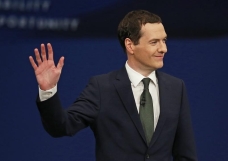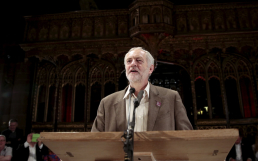Chancellor of the Exchequer George Osborne said he would act to soften the impact of his welfare reforms after parliament's upper chamber voted to block changes to a tax rule which supplements the income of workers on low pay.
Osborne, seen as the front runner to succeed Prime Minister David Cameron before 2020, was forced to backtrack on cuts to so-called tax credits after the unelected chamber defeated a key component of his drive to wipe out the budget deficit.
It is a blow to the chancellor, who has staked his reputation on making Britain 'live within its means', and could spur the leadership ambitions of other members of the ruling Conservative Party who are keen to replace Cameron.
"I have said I would listen and that's precisely what I intend to do," Osborne told broadcasters.
"I believe we can achieve the same goal of reforming tax credits, saving the money we need to save to secure our economy, while at the same time helping in the transition."
In voting against the bill, which had been passed by Britain's elected lower chamber, the House of Lords overturned long-standing political convention by voting to reject a financial matter, setting up a constitutional conflict.
Designed to reduce the annual welfare bill by around £4.4 billion, the changes have been widely criticised by those who say they will penalise working families – including by some Conservative lawmakers.
Peers backed two motions to delay the governments plans, voting 307 to 277 in favour of one which required the government to conduct an independent report on the impact of the cuts before the issue is brought back to the Lords.
They also voted 289 to 272 in favour of requiring the government to put in place a scheme of transitional protection for at least three years for those affected by the cuts.
"The government insists there is no alternative to these cuts... but actually, my Lords, there is," said Patricia Hollis, one of the peers who proposed the delay.
"We can and should offer transitional protection to existing families who count on tax credits, single parent, the self-employed ... families with disabled children and carers."
Peers voted to require the government to conduct an independent report on the impact of the cuts before the issue is brought back to the Lords, and voted to require the government to put in place a scheme of transitional protection for at least three years for those affected by the cuts.
The vote also tees up a power struggle between the Lords and the directly-elected Commons, that could reignite calls for a radical overhaul of the lawmaking process.
One Conservative aide said that by defying warnings not to break convention, the Lords had given the government cause to "do something quite substantial" in return.
"It is a very serious clash indeed," Vernon Bogdanor, Research Professor at the Institute for Contemporary British History at King's College London, told the BBC. He said the vote challenged the non-legal rules regulating the two houses.
One option open to Cameron would be to use his right to appoint members to the Lords to flood it with sympathetic members. Any such move would be opposed by those who argue the chamber is undemocratic and already too large.
The Lords is already largely made up political appointees recruited by successive governments, many of whom are entitled to serve life terms. With more than 800 eligible members it is the world's second-largest legislative body after China's National People's Congress.















